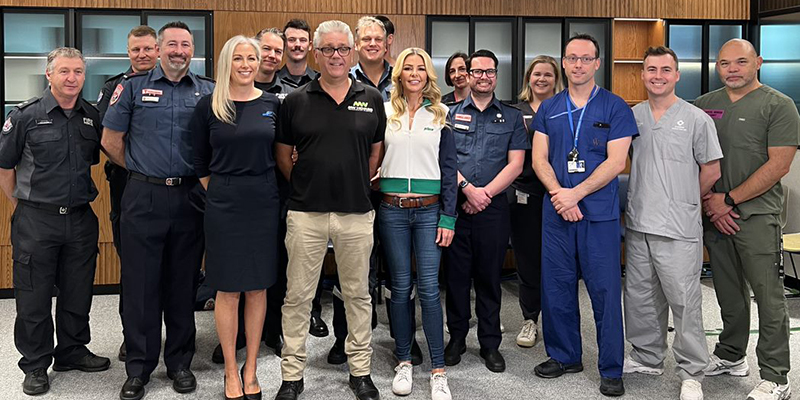World class medical research helping save lives
May 2, 2023 | in News
In March 2022, 43-year-old Mark Wohlers unexpectedly suffered two cardiac arrests. The healthy and active father-of-one was playing a regular round of golf when he experienced dizziness and chest pain and decided to drive home to rest.
Mark was about a kilometre from his Deepdene house when he called his wife, Victoria.
“Since I have known Mark, he would never ever walk off the golf course for anything, so I knew something was wrong, which is why I immediately called Triple Zero (000),” Victoria said.
Mark is alive today thanks to an incredible chain of survival involving his wife who called Triple Zero (000) immediately, firefighters who rushed to the scene and Ambulance Victoria paramedics and Alfred Health intensive care specialists who performed lifesaving surgery on the street.

The life-saving team from ESTA, Fire Rescue Victoria, Ambulance Victoria, and Alfred Health with patient Mark Wohlers.
The Australian-first CHEER3 (CPR, pre-Hospital ECMO and Early Reperfusion) feasibility study is a partnership between Ambulance Victoria and Alfred Health, where an ambulance rapid response car is equipped with a portable heart-lung machine known as Extra-Corporeal Membrane Oxygenation (ECMO).
Intensive care specialists from The Alfred travel with MICA paramedics to patients suffering cardiac arrest within a 25-minute radius, bringing the technology with them. It means people can get the potentially lifesaving treatment they need faster, improving their chance of survival.
Once on scene, the patient is placed on ECMO and stabilised so they can be taken to The Alfred for further treatment.
Ambulance Victoria Medical Director Associate Professor David Anderson said Victoria has the best cardiac arrest survival rates in the country and one of the best in the world thanks to bystanders willing to step in and help.
“Mark’s story is a timely opportunity to remind people what to do if they see a cardiac arrest,” David said.
“We know minutes matter so if a person receives bystander CPR and defibrillation, their chance of survival increases by more than 70 per cent.”
David said Ambulance Victoria, as a research-focussed organisation, also runs clinical trials to test breakthrough treatments to further improve the chances of patients like Mark returning to their loved ones.
“Mark was fortunate to be part of a feasibility study that brings cutting edge technology from the hospital to the streets – which was the icing on top of his remarkable survival story,” David said.
“Victoria is home to some of best and brightest medical specialists, with advanced medical equipment like ECMO. That makes it the best place to carry out such ground-breaking research,” David said.
Every day, about 20 Victorians suffer a cardiac arrest and only one in 10 survive. There are three simple steps to save someone’s life: Call (Call Triple 000), Push (Perform CPR) and Shock (use an AED if available).
